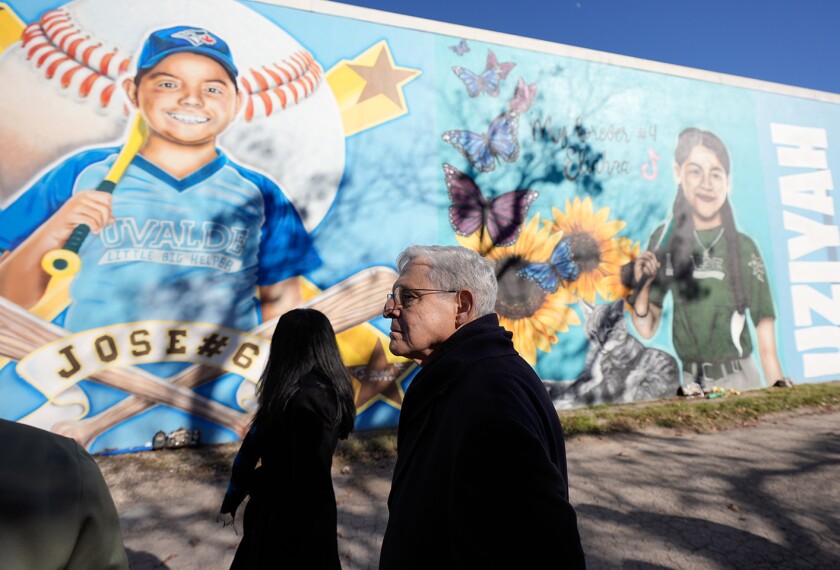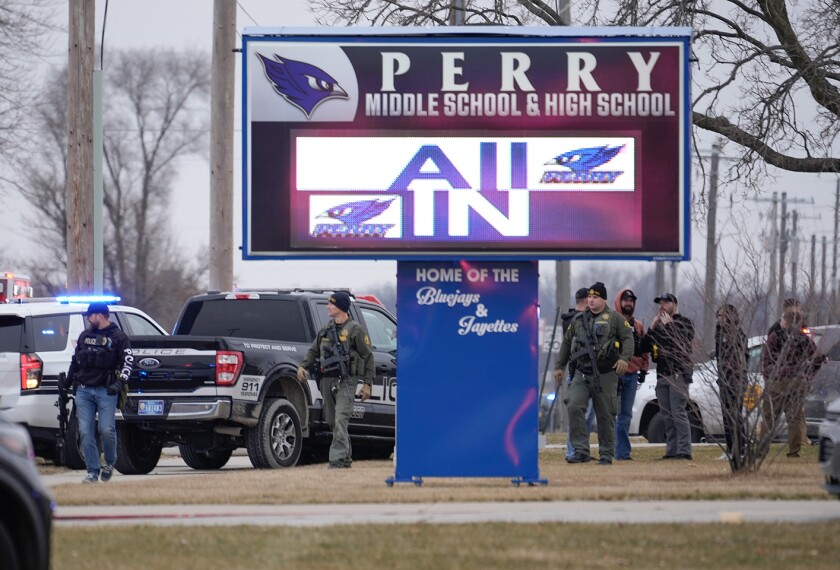The Israel-Hamas war, which started more than two months ago, is one of the most challenging current events topics to tackle in a K-12 classroom. Students and educators are in a difficult position of trying to process their feelings and guide their views of the emotionally charged crisis based on facts.
Educators have been tasked with helping students navigate the ongoing conflict. Some school and district leaders have sent out emails providing resources and guidance to staff, students, and families. Some social studies teachers have set aside class time to discuss the war and let students’ questions guide discussions.
Shortly after the war began, the social studies department at Benjamin Franklin High School in New Orleans hosted an after-school discussion that gave students the opportunity to learn more about the war and the history of the Israel-Palestine region.
Cait Rohn, one of the social studies teachers who led the discussion, said the students who attended liked having “a more holistic view” of the conflict and “appreciated being in a space with other kids who were open to that, because it can be hard to let your guard down with somebody who is not willing to do the same thing.”
Education Week separately interviewed a Jewish student and a Muslim student from Benjamin Franklin High School about how they’re navigating feelings and discussions about the conflict. Charlie Finger, 16, is a junior who has relatives in Israel. Finger attended the after-school discussion. Amir Karimipour, 15, is a sophomore who has relatives from Iraq and Iran. Karimipour didn’t attend the after-school discussion, but several students said they appreciated talking with him about the Middle East, Islam, and how it relates to the current Israel-Hamas war.

The following interviews have been edited for brevity and clarity.
How did you hear about the war?
Karimipour: On Oct. 7, I saw my social media being blown up by a bunch of my Jewish friends. They were posting about how Israel had been attacked. So, I was like, “what’s going on?” I went ahead and researched what was happening. Over the days that followed, I kept following up with the story, trying to figure out what happened, and then I eventually started posting on my own social media [about] the truth, because I feel that the major news stories that were going over it were not being very neutral—they’re being kind of biased about it, so I was just trying to spread awareness on my own Instagram stories.
I will speak to them about it, the truth about what's going on, but I won't go around just screaming in people's faces.
What was your initial reaction when the war broke out?

Finger: I didn’t used to search up the New York Times when I was bored in biology, but I just had to start paying a lot more attention to world events, not just whatever silly things that passed [through] my head. It’s certainly taken up some bandwidth. In the beginning, I remember I saw something about it on some social media the night that it happened. I didn’t even think it was real. I thought it was just like another day. I don’t think it really hit me that it was different until the next morning or afternoon.
How are you educating yourself about what’s going on in Israel and Gaza?
Karimipour: I don’t really go with the major news coverages like CNN, Fox News, the ones here, because I knew that they were going to be a little biased. I go to the other news sources from [the Middle East], such as Al Jazeera, and smaller news coverages on social media, to get sort of familiar with what is going on so that whenever I talk about this conflict, I am able to tell the truth of it, not my own biased opinion.
Have you talked to your friends or peers about the war?
Finger: No, I think it’s such a polarizing issue, and I don’t really want to get into major drama with anybody over this. I know people do have discussions with their peers about this. I personally avoid it. I think it would not be good for me to do that.
Karimipour: I have, definitely, but I don’t go and impose it on them. If they ever ask me anything, I will speak to them about it, the truth about what’s going on, but I won’t go around just screaming in people’s faces.
I do my best to not devolve to bickering, but I see that it does devolve into either antisemitism or Islamophobia or, most of the time, both.
How can we have better, more civil conversations about this?
Finger: I think it is so hard. There are so many wrongs on both sides. It makes it so difficult to get the perspective that’s required for a discussion to be civil and to not feel attacked by saying, “Israel shouldn’t have done this,” “Palestine shouldn’t have done this.” I think people often don’t want to admit that whatever side they like more has ever done anything wrong. I do my best to not devolve to bickering, but I see that it does devolve into either antisemitism or Islamophobia or, most of the time, both.
Karimipour: If you’re a civilized person, you’re not going to cause a really big stir. You’re going to take other people’s opinions, you’re going to think about it, and you’re going to not only defend your opinion, [but] you’re also going to take in new opinions to change your own opinion, make your own decisions. But there are a lot of people who are not going to do that. They’re going to just argue against it. They’re not going to take in new information and understand things in a new way. They’re just going to continuously defend their own initial opinion.
What was it about the after-school discussion that made it easier to talk about this?
Finger: I think it was so successful because everyone went there wanting to learn. No one was there to argue their opinion, which really helped. If you go into these discussions with the mindset of “I’m trying to learn the other perspective,” or learn more about my perspective or both, then it doesn’t devolve as often. I think not enough people do that—I mean, I know I don’t all the time.
Anything else you’d like to mention?
Finger: I think everyone approaches this differently. I can’t speak for every person my age, every student in the world. I can only speak for myself, and I think everyone else can only speak for themselves. Everyone is approaching this in their own way, and sometimes it’s good, sometimes it’s bad. It’s hard for everyone to process. There’s so many sources of information and you just don’t know where you’re going to get it from. It’s a constant struggle. I think it’s worth noting that with so many sources of information, 70 percent of that might just be total [BS]. They’re not reliable. They’re partisan. On top of that, everyone has their own opinion, and you could lose a friendship just like that.
Karimipour: When learning about this conflict, or when observing this conflict, I just want people to remember their humanity, and how this problem is all caused by governmental/political issues. When they observe it, I’d like for people to just remember their humanity and stand with the innocent lives that are being taken, whether Israeli or Palestinian. Innocent lives being taken is not OK.






